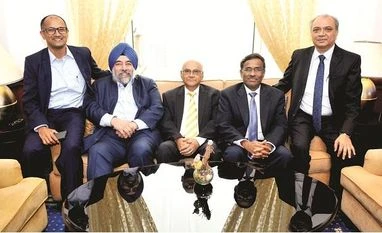The last year-and-a-half was a challenging one for both debt and equity fund managers. On the equity side, the returns charts were lopsided with a select pack of stocks accounting for most of the outperformance across categories. The underperformance of the small- and mid-capitalisation companies continued over this period, as investors sought refuge in safety due to a slowdown in earnings growth. Given the narrow breadth of the market, the outperformers in the equity category were fund managers who were consistent with their strategies and reaped the dividends.
Prashant Jain of HDFC Mutual Fund was adjudged the winner in the large-cap equity category as investments in corporate banks, industrials and energy helped deliver returns which were 900 basis points higher than the fund’s benchmark, and 400 basis points higher than the nearest competitor.
In the mid- and small-cap category, Shreyas Devalkar of Axis Mutual Fund was able to do better than the benchmarks by reducing exposure to small caps while focussing on quality mid-cap companies, which were exhibiting growth. In the multi-cap category, Roshi Jain of Franklin Templeton finished at the top of the ranking by avoiding momentum and having a bias towards large caps.
On the debt front, it was a tale of two halves. While rates had started to tighten at the start of 2018, led by a number of factors including the US Federal Reserve increasing its pace of rate hikes, depreciation of the rupee and FPI (foreign portfolio investor) outflow, the trend was divergent after September when the IL&FS crisis hit the market. On the one hand the yields on government 10-year bonds fell sharply, those on corporate bonds were down marginally.
While Manish Banthia of ICICI Prudential AMC was able to stay ahead of the market and manage duration as the cycle turned, IDFC AMC’s Anurag Mittal adopted a safety first approach with a AAA-rated portfolio as compared to competition which was exposed to riskier paper. This helped him beat the benchmarks in the short to medium duration fund category.
To zero in on the winners, the jury, headed by G N Bajpai, former chairman of the Securities and Exchange Board of India and Life Insurance Corporation, looked at multiple factors and not just the quantum of outperformance. Other jury members included Ashvin Parekh, managing partner, Ashvin Parekh Advisory Services; Vikram Limaye, managing director and CEO, National Stock Exchange; Jaspal Bindra, executive chairman, Centrum Group; and Sandeep Parekh, managing partner, Finsec Law Advisors.
Other key parameters that were considered included risk-adjusted returns as well as quality aspects such as portfolio diversification and concentration of investments, which were applied to pick the best money managers, both for equity as well as debt.
For the first time this year, the number of awards were increased from two to five — three in the equity and two in the debt funds category. For the equity category, the sub-categories included large cap, small cap and multi cap. In debt, the sub-categories were short to medium duration and medium to long duration.
In the equity space, only open-ended diversified growth equity schemes were considered. Sector and thematic schemes, which usually invest in companies from a certain section of the market, were excluded. The rankings for both equity and debt are on the basis of the Sharpe ratio, which takes into account returns generated by the fund in excess of the risk-free FBIL MIBOR Overnight rate of 5.97 per cent. For debt funds, ultra-short-term, liquid, floating rate, money market, overnight and gilt schemes were excluded since these funds are relatively short-term, or provide little avenue for a fund manager to display skill in picking winning strategies and securing the highest returns for investors without taking an inordinate amount of risk.
The methodology also took into account a threshold limit for the fund size, whereby the funds in the bottom 10 percentile were excluded based on quarterly average assets under management (AUM). The data examined was for 12-month period ended June 30, 2019, and was provided by Morningstar India.
The criteria for the best fund manager included a requirement for the manager to have managed the fund for at least a year. The rankings were done on the basis of “adjusted Sharpe ratio”. A score based on the weighted average of the Sharpe ratio achieved by each scheme managed by the fund manager, and in relation to the category AUM, was arrived at. Thus, the jury looked at the risk-adjusted performance of the fund managers, adjusted for the size of the assets managed by them. This process would help identify the fund manager who has generated the highest amount of returns, adjusted for the risk taken to generate such returns.
The jury highlighted a few parameters that stood out, while selecting the best performers. The best equity fund managers across categories delivered returns which were more than double that of the respective benchmarks. On the debt side, the focus was largely on quality with most of the papers rated AAA or more, which meant zero compromise on the safety aspect. Needless to say, the weighted risk-adjusted returns for the fund managers was the highest among the top performers in the respective categories.
Unlock 30+ premium stories daily hand-picked by our editors, across devices on browser and app.
Pick your 5 favourite companies, get a daily email with all news updates on them.
Full access to our intuitive epaper - clip, save, share articles from any device; newspaper archives from 2006.
Preferential invites to Business Standard events.
Curated newsletters on markets, personal finance, policy & politics, start-ups, technology, and more.
)